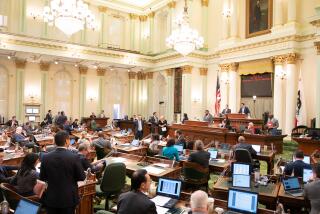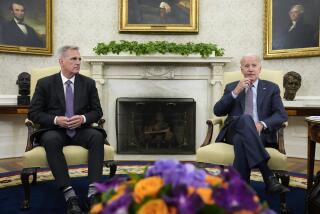Governors’ Agreement Fell Short on Welfare Reform, Wilson Says
- Share via
SACRAMENTO — Gov. Pete Wilson staked out the conservative quarter of the nation’s debate over welfare and Medicaid reform last week in Washington, criticizing a bipartisan coalition of his fellow governors by saying their hallmark agreement does not go far enough.
Only reluctantly, Wilson said, did he join his colleagues in last Tuesday’s unanimous agreement at the National Governors Assn. winter meeting. The accord was instantly hailed as evidence of common ground between Republicans and Democrats on some key issues that have blocked a budget deal between Congress and the White House.
The California governor said, however, he would have preferred an agreement that did not include requirements of minimal assistance for Medicaid recipients because he believes states should have ultimate authority in deciding how to care for their poor.
“It’s an improvement--that’s why I voted for it,” Wilson said in an interview. “I can’t say I’m disappointed in [the governors] personally, they were eager to make a deal. They are concerned about getting the bird in the hand and acting on it . . . and that’s a legitimate point of view.”
Since the governors’ agreement was passed, initial enthusiasm for it has been tempered somewhat by criticism from the left and right.
Democrats in particular have attacked the welfare reform plan that would change the nation’s assistance program from an entitlement to a block grant system that gives states broad discretion over subsidies. Wilson said he was largely satisfied with the governors’ welfare plan.
Instead, Wilson focused his complaints on the Medicaid portion of the agreement where the governors endorsed a federal requirement that assistance be provided to pregnant women, children, elderly and disabled whose income falls below minimum standards.
It was the first time Wilson’s vision has been matched up against Republican colleagues who have shared much of his anti-Washington rhetoric. And unlike Wilson, many of the other governors said the agreement would not restrict their own Medicaid reform plans because they favor support for the populations where assistance would be required.
“In Medicaid . . . we gave guarantees to classes that are pretty much common sense,” said John Truscott, spokesman for Michigan Gov. John Engler, a GOP leader in the negotiations. “When you’re dealing with the disabled, poor, elderly and pregnant women, everybody pretty much agreed on coverage.”
Wilson aides said they expect most of those populations would also be covered in any plan the governor proposed for California.
But Wilson has also said he hopes to extend Medicaid coverage--known as Medi-Cal in California--to the working poor who are left out of the system. To pay for some of that addition, he wants to reduce or eliminate resources to populations that were protected in the governors agreement.
“I didn’t think [the governors] went far enough toward achieving the flexibility for the states that we in fact deserve and which, if we had, we could use to great advantage in extending health care coverage to people who are equally deserving but who are now and likely will be excluded, the working poor,” Wilson said.
He said the pact, if adopted, would prevent him from doing “all that I’d like to do. . . . I think we’ll be able to do a certain amount.”
Instead of cooperating with Democrats, Wilson officials said they went to the Washington meeting with hopes that the Republican governors would join in an effort to criticize President Clinton’s performance on welfare and Medicaid reform. Specifically, Wilson complains that Clinton has delayed approval of several waivers that are required to implement welfare reforms already passed by the California Legislature.
More to Read
Get the L.A. Times Politics newsletter
Deeply reported insights into legislation, politics and policy from Sacramento, Washington and beyond. In your inbox twice per week.
You may occasionally receive promotional content from the Los Angeles Times.










